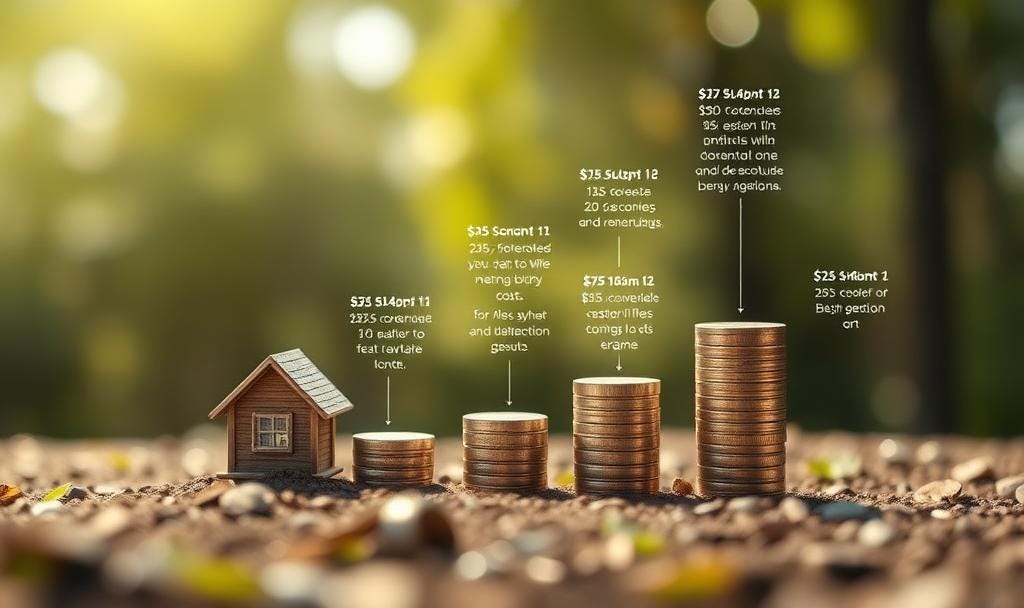With housing inventory tightening in Western North Carolina (WNC), some buyers are turning to land. Tranquility. A view of the ridgeline. Hawks soaring overhead. Maybe even a dream of a home on an idyllic mountaintop someday.
But buying land isn’t the same as buying a home. Not even close.
The financing is different. The risks are greater. And if you’re not prepared for how land loans work—or the hidden costs of raw or unimproved property—you could be in for a surprise.
In this article, I’ll explain what makes land purchases different, why the loans cost more, and what to expect before you make an offer on that dreamy WNC parcel.
Why are land loans more expensive than mortgages?
When you buy a home, the structure itself helps secure the loan. It has value. It’s livable. And it starts working for you right away.
Land doesn’t do that. It just sits there—sometimes for years—so lenders consider it a riskier investment. That risk shows up in:
Higher interest rates.
Larger down payments (often 20–50%).
Shorter loan terms (many are 3–5 years, but some lenders offer up to 20).
If you're buying land but don’t plan to build soon, expect a steeper approval process. You’ll likely need stronger credit, detailed documentation, and more money down than a home loan.
What do lenders need before approving a land loan?
If you’re paying cash, skip ahead. But if you’re financing the land, most lenders will expect a clear usage plan.
Will this be your primary residence, a second home, or something else?
Are you building right away, or holding it for the future?
Is the land already approved for the use you have in mind?
The more specific your answers, the better your odds of getting approved, especially in WNC, where slope, soil, and zoning can vary dramatically from one lot to the next.
What loan options are available for buying land in WNC?
Here are the most common options for land buyers in the region.
Local land loans (banks and credit unions): Institutions like SECU, AgSouth, AgCarolina, and Carolina Farm Credit understand the topography and zoning rules in our region. They often offer more flexible terms than national lenders.
Construction-to-permanent loans: Ideal if you're building right away. These loans combine the land purchase and home construction into one product with one monthly payment.
USDA loans: Available only if you’re building a primary residence on land in a USDA-eligible rural area. You’ll need to meet income and property requirements, too.
Home equity loan: If you already own a home, you can use your equity to buy land. You can sometimes get better terms, but it does put your current home at risk.
Owner financing: The seller acts as the lender. Owner financing is often more flexible, but not always structured by professionals. Always use a real estate attorney.
SBA 504 loan: These loans are designed for business purposes, so they’re only an option if you buy land for commercial development, not residential use.
What type of land do you want to buy?
Not all land is equal in the eyes of a lender or builder. There are three main categories of land.
Raw land: No utilities, no roads, and no development. This type is the hardest to finance and usually requires a large down payment.
Unimproved land: May have road access or utilities nearby, but they’re not connected. Easier to finance than raw land, but still seen as risky.
Improved land: Typically includes road access and utility hookups or permits. It’s the most lender-friendly type, but even “improved” land in WNC may require installing a septic system or drilling a well.
Will you work with an agent who knows WNC land?
Land purchases require a different skillset than home sales. Look for an agent who understands:
Zoning and land-use restrictions.
Easements and rights-of-way.
Slope, soil, and water table issues.
Well and septic permitting.
Agents with the Accredited Land Consultant (ALC) designation have specialized training and experience in these issues. Finding someone who speaks the language fluently is worth it if you're serious about buying land.
What extra costs should you budget for when buying land?
Land often seems more affordable than homes, but the hidden costs add up fast. Here’s what you might be looking at in WNC.
Surveying: $500–$3,000 per acre, depending on location and complexity.
Septic system: Permits cost $650– $850, then add on $7,500–$50,000+ for installation (costs rise with slope and poor soil).
Well drilling: $3,750–$15,300 for drilling, pump, and installation.
Driveway or road construction: Varies widely based on terrain, materials, and length.
Foundation prep: In mountain areas, excavation and reinforced foundations can exceed $100,000.
Closing and title costs: Expect to pay standard real estate fees; in some deals, you can negotiate with the seller.
Also factor in ongoing costs for clearing, erosion control, fencing, and site maintenance—especially if you're not building immediately.
Where can you find land for sale in WNC?
Some of the best land in WNC never hits the big-name websites. But they’re still a good place to start.
Other smart strategies:
Drive through your desired area and look for signs (yes, this really works).
Check classified ads in local newspapers like Mountain Xpress.
Ask your agent about off-market parcels.
Search government sites like RealEstateSales.gov or Disposal.gsa.gov.
Ask your real estate agent for help finding land that meets your criteria. (Hint: I can help you here; contact me and we’ll talk.)
What should you check before you making an offer?
Do your due diligence—thoroughly. North Carolina is a “buyer beware” state. And in Western North Carolina, not all “buildable” lots are as straightforward as they appear.
Check —
Zoning: Is the land approved for what you want to do?
Access: Is there a legal right-of-way to a public road? If it’s a private road, is there a maintenance agreement?
Utilities: Are electric, water, and sewer available, or will you need to install everything yourself?
Don’t rely solely on the listing. Contact the local zoning office, health department, and building department to verify what's possible—and what’s not. Your agent (hint, hint) can do this legwork for you.
Final thoughts: Is WNC land ownership right for you?
Buying land in the mountains can be a beautiful long-term investment. But it’s not plug-and-play like a typical home purchase. You’ll need patience, planning, and a local real estate agent who understands what makes a good piece of land actually buildable.
Do you have questions or need help getting started? Contact me. I’m Craig, and I’ll be happy to point you toward resources or listings that fit your goals.













